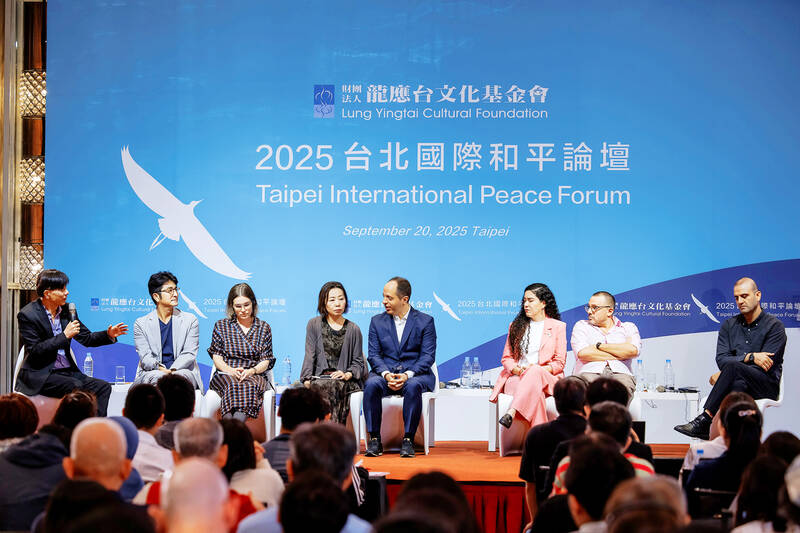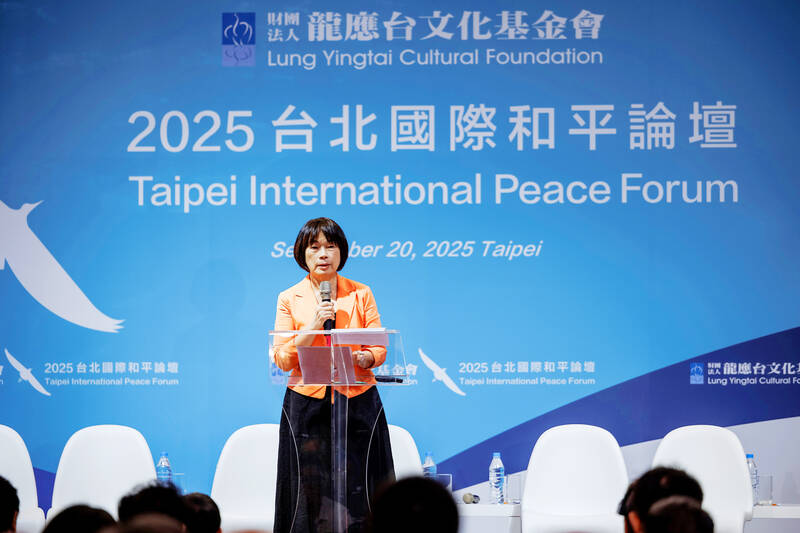Palestinian Hazem Almassry says Israel wants peace — just as Russia wants peace and China wants peace. But peace based on what? It’s a fundamental question that reverberated throughout the opening session of the inaugural Taipei International Peace Forum, which yesterday saw experts from around the world descend on a ballroom in Taipei to give their perspectives on the current state of the global order and where it might be heading.
Almassry’s framing of the question made for some uncomfortable listening because of Taiwan’s support for Israel and the obvious parallels between a Palestinian occupied present — where Israel is starving the population and, according to a UN commission, is committing genocide — and a possible Taiwanese future occupied by China, an occupied future done in the name of appeasing the Chinese Communist Party.
“What kind of peace are we looking for and how to bring about peace?” he asked the audience. “Is it based on beating you, subjugating you and keeping you under control. Or is it based on justice, equality, freedom and dignity that makes everyone win.”

Photo courtesy of the Lung Ying-tai Cultural Foundation
Almassry’s skepticism about the possibility of peace was echoed by Israeli Roi Silberberg, who said that his fellow citizens will never live in safety and security by using military force and oppression.
“Sadly, many in Israel don’t feel like this,” said the director of the School for Peace, Wahat al Salam-Neve Shalom.
DIVERSE APPROACHES

Photo courtesy of the Lung Ying-tai Cultural Foundation
Taiwan has no meaningful peace studies at the educational, civil society or governmental level — odd considering the decades of tension across the Taiwan Strait. The forum was in part meant to rectify that, and provide a platform for Taiwan to start thinking about possible avenues for peace.
In that light, former culture minister Lung Ying-tai (龍應台), whose eponymous foundation hosted the event, said that Taiwanese have to think not just about war games, but peace games, “not only as a choice for ourselves but as a commitment we offer the world as well,” she said.
It’s a theme that was later picked up by Silberberg.
“The goal of the peace games is to be as truthful and honest as you can so you can arrive at a better understanding of the other,” he said. “To have care for the other, not only understanding but caring for the other. And this maybe and hopefully will create trust and then both win the game.”
Director of Ocean Nexus Center Yoshitaka Ota began his talk in the form of reconciliation by apologizing for Japan’s colonial past in Taiwan and pledging to promote knowledge of Japan’s imperialism at home. He went on to discuss the importance of “ocean equity,” or pushing for social equality at sea so that marginalized peoples are taken into consideration when governments are crafting and implementing policy.
“Ocean plays a huge role in our peace building especially if we are talking about national and human security, both necessary part of peace,” he said.
Ota said that planning for the future comes with recognizing that society is deeply unequal, the impact of which will only get worse as the climate changes and the people’s capacity to act is stymied by dis/misinformation that calls into question the efficacy of scientific knowledge.
It’s a narrative that Emma Baumhofer understands intimately. The independent consultant in digital peace building and design and a product of Silicon Valley’s early heady days recalls the early aughts as a time when people viewed new technologies as beneficial to humanity. No longer.
Baumhofer says that the mood around technology has changed radically over the past two decades.
“It’s not neutral. This is a key thing that we’ve discovered in the past 20 years. We formerly thought that technology was a neutral force, we now know that it is not,” she said.
And with issues such as mental health crises and censorship, we are seeing the impact in real time.
“It’s not on the fault of technology that we are seeing these divisions, but technology plays a key role in amplifying these divisions and dramatically changing our information and communication environments,” she said.

The depressing numbers continue to pile up, like casualty lists after a lost battle. This week, after the government announced the 19th straight month of population decline, the Ministry of the Interior said that Taiwan is expected to lose 6.67 million workers in two waves of retirement over the next 15 years. According to the Ministry of Labor (MOL), Taiwan has a workforce of 11.6 million (as of July). The over-15 population was 20.244 million last year. EARLY RETIREMENT Early retirement is going to make these waves a tsunami. According to the Directorate General of Budget Accounting and Statistics (DGBAS), the

Last week the story of the giant illegal crater dug in Kaohsiung’s Meinong District (美濃) emerged into the public consciousness. The site was used for sand and gravel extraction, and then filled with construction waste. Locals referred to it sardonically as the “Meinong Grand Canyon,” according to media reports, because it was 2 hectares in length and 10 meters deep. The land involved included both state-owned and local farm land. Local media said that the site had generated NT$300 million in profits, against fines of a few million and the loss of some excavators. OFFICIAL CORRUPTION? The site had been seized

Five years ago, on the verge of the first COVID lockdown, I wrote an article asking what seemed to be an extremely niche question: why do some people invert their controls when playing 3D games? A majority of players push down on the controller to make their onscreen character look down, and up to make them look up. But there is a sizable minority who do the opposite, controlling their avatars like a pilot controls a plane, pulling back to go up. For most modern games, this requires going into the settings and reconfiguring the default controls. Why do they

Take one very large shark, a boat (we’re gonna need a bigger one of those) and a movie that ran way over budget and you’ve got all the ingredients of a career-making film for one of Hollywood’s most successful directors. Now fans of Jaws — Steven Spielberg’s terrifying thriller about a man-eating shark — can re-live the movie as it celebrates its 50th anniversary in an exhibition at the Academy Museum in Los Angeles. “The film certainly cost me a pound of flesh, but gave me a ton of career,” Spielberg told reporters as he toured exhibits of props and memorabilia